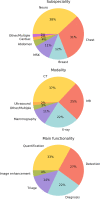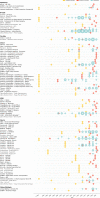Artificial intelligence in radiology: 100 commercially available products and their scientific evidence
- PMID: 33856519
- PMCID: PMC8128724
- DOI: 10.1007/s00330-021-07892-z
Artificial intelligence in radiology: 100 commercially available products and their scientific evidence
Abstract
Objectives: Map the current landscape of commercially available artificial intelligence (AI) software for radiology and review the availability of their scientific evidence.
Methods: We created an online overview of CE-marked AI software products for clinical radiology based on vendor-supplied product specifications ( www.aiforradiology.com ). Characteristics such as modality, subspeciality, main task, regulatory information, deployment, and pricing model were retrieved. We conducted an extensive literature search on the available scientific evidence of these products. Articles were classified according to a hierarchical model of efficacy.
Results: The overview included 100 CE-marked AI products from 54 different vendors. For 64/100 products, there was no peer-reviewed evidence of its efficacy. We observed a large heterogeneity in deployment methods, pricing models, and regulatory classes. The evidence of the remaining 36/100 products comprised 237 papers that predominantly (65%) focused on diagnostic accuracy (efficacy level 2). From the 100 products, 18 had evidence that regarded level 3 or higher, validating the (potential) impact on diagnostic thinking, patient outcome, or costs. Half of the available evidence (116/237) were independent and not (co-)funded or (co-)authored by the vendor.
Conclusions: Even though the commercial supply of AI software in radiology already holds 100 CE-marked products, we conclude that the sector is still in its infancy. For 64/100 products, peer-reviewed evidence on its efficacy is lacking. Only 18/100 AI products have demonstrated (potential) clinical impact.
Key points: • Artificial intelligence in radiology is still in its infancy even though already 100 CE-marked AI products are commercially available. • Only 36 out of 100 products have peer-reviewed evidence of which most studies demonstrate lower levels of efficacy. • There is a wide variety in deployment strategies, pricing models, and CE marking class of AI products for radiology.
Keywords: Artificial intelligence; Device approval; Evidence-based practice; Radiology.
Conflict of interest statement
KGvL, SS, MJCMR, and MdR declare no relationships with any companies, whose products or services may be related to the subject matter of the article.
BvG is co-founder and shareholder, and receives royalties from Thirona and receives royalties from Delft Imaging and Mevis Medical Solutions.
Figures





References
-
- Radiological Society of North America (2017) AI Exhibitors RSNA 2017. Radiological Society of North America. http://rsna2017.rsna.org/exhibitor/?action=add&filter=Misc&value=Machine.... Accessed 6 Oct 2020
-
- Radiological Society of North America (2019) AI Exhibitors RSNA 2019. Radiological Society of North America. https://rsna2019.mapyourshow.com/8_0/explore/pavilions.cfm#/show/cat-pav.... Accessed 6 Oct 2020
-
- Huisman M, Ranschaert ER, Parker W et al (2020) Implementation of artificial intelligence: is the community ready? An international survey of 1,041 radiologists and residents [abstract]. In: Proceedings of the European Congress of Radiology; 2020 Jul15–19; Vienna, Austria: ESR; 2020. Insights into Imaging, pp 302–303
-
- Wichmann JL, Willemink MJ, De Cecco CN (2020) Artificial intelligence and machine learning in radiology: current state and considerations for routine clinical implementation. Invest Radiol 55 - PubMed
Publication types
MeSH terms
LinkOut - more resources
Full Text Sources
Other Literature Sources
Medical

